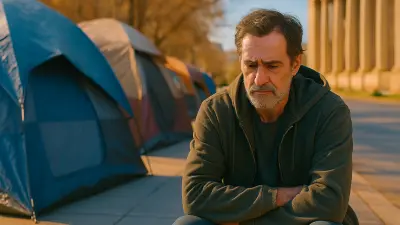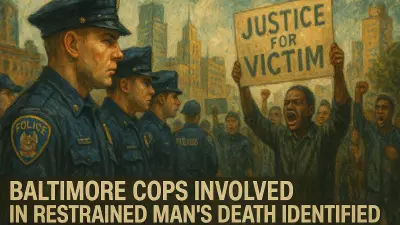In July 2024, a bill went into effect making Kentucky one of the first states in the country to criminalize street camping. One year later, we’re left with a chilling legacy: hundreds of citations, growing mistrust of outreach efforts, worsening homelessness, and a question that still hangs heavy. Why did we let this happen?

According to statewide data, more than 425 charges for unlawful camping have been filed across 30 Kentucky counties. That is more than one citation a day, overwhelmingly targeting unhoused people just for trying to survive. The largest share, 42%, was issued in Jefferson County, followed by Fayette (13.5%), Boyd (12%), and Daviess counties (7.4%).
But these aren’t just numbers. These are fellow Kentuckians trying to get by.
Among them are:
- A man was cited and moved along after being woken up by police kicking his feet as he slept under a viaduct.
- A woman arrested while changing clothes in a parking garage during a heatwave was taken to jail without pants. She was later released, still without pants.
- A pregnant woman was cited while in active labor. Her story made national headlines. She has housing now, but it did not come from city services, it came from community care.
- A man cited multiple times, stuck in a cycle of court dates and jail, desperate for help that never comes.
This law has not ended or even decreased homelessness. Statewide, numbers show a 10% increase.
Daily “caravan sweeps” in places like Louisville’s Portland neighborhood give people five minutes to gather their only possessions — medications, documents, court papers, — before bulldozers and police trucks roll in to destroy their shelter and take what little they have to a dump. Legal identification, birth certificates, prescriptions, everything they have managed to hold on to, discarded without compassion.
Without ID, people cannot get housing, cannot get services, can’t get help.
This is active harm.
This is active cruelty.
This is an active cycle.
Even more disturbing, some of these citations come with promises of treatment or shelter that never materialize. Instead, people are met with citations, jail cells or court dates they cannot make, leading to bench warrants and deeper entanglement in the criminal legal system.
Street outreach workers and advocates call this what it is: cruelty masquerading as a policy solution. One year in, we’ve seen what this bill delivers: more fear, more displacement, and a widening gap between the people who need help and the services trying to reach them. The word “outreach” itself is now so mistrusted that some service providers must introduce themselves by name, just to avoid being mistaken for the police.
Kentuckians deserve better than this. We can be better than this.
We cannot arrest our way out of poverty. We cannot bulldoze our way to safety. And we cannot claim moral leadership while treating the unhoused with contempt and cruelty.
What works is not criminalization. What works is affordable housing.
Permanent supportive housing has a 97% success rate right here in Kentucky. Non-congregate shelters with trauma-informed care, robust outreach efforts, and harm reduction strategies are what keep people safe and, ultimately, housed.
Other states may struggle to find people and organizations to help. In Kentucky, that’s not our struggle. Organizations like VOCAL-KY, KyPolicy, St. John’s Center, Louisville Outreach for the Unsheltered, the Homeless and Housing Coalition of Kentucky and others are in the fight every day, despite limited resources.
The additional harm is, those of us working to help real people in a real way, are shackled with limited capacity, funding cuts, and a government whose members are actively working to undermine the work.
This is not just a policy failure. It’s a moral one. But it doesn’t have to stay that way.
We urge our state and local leaders to confront the root causes of homelessness: the lack of affordable housing, the absence of mental health support, and policies that prioritize punishment over people. We can and must invest in solutions that lift people up instead of pushing them further down.
Because no one should be cited for trying to survive.
Not in Kentucky.
Not anywhere.







